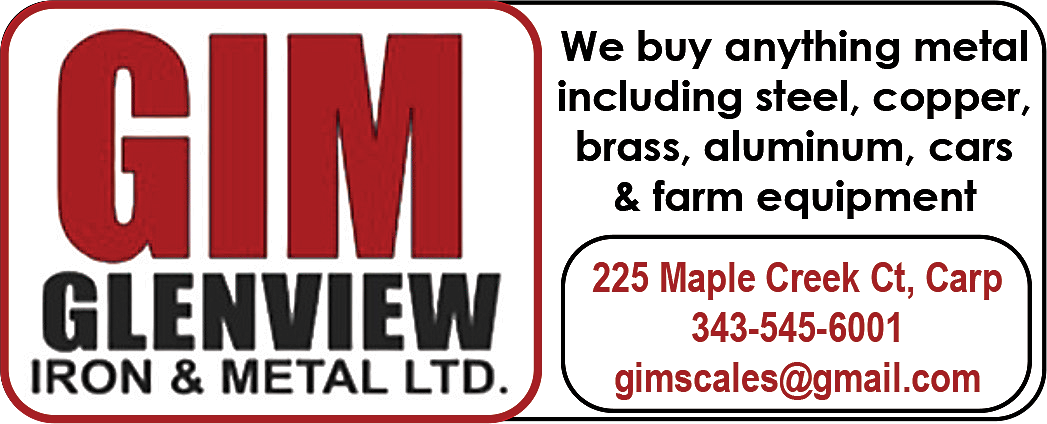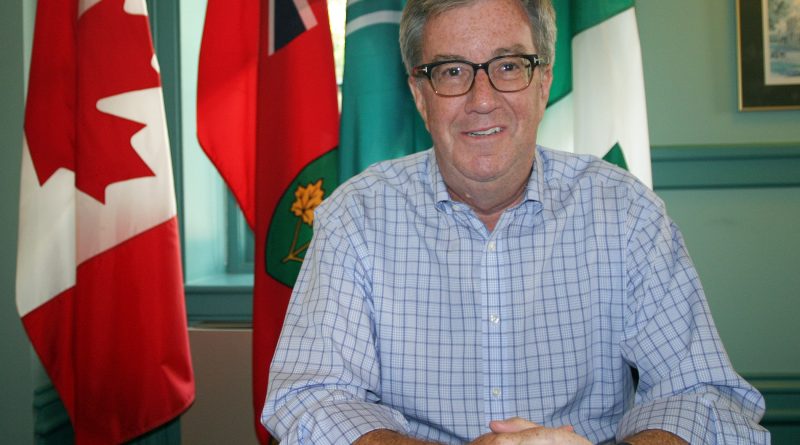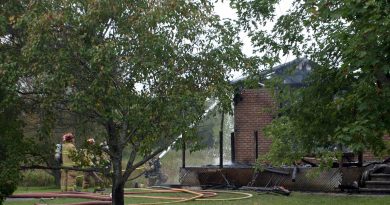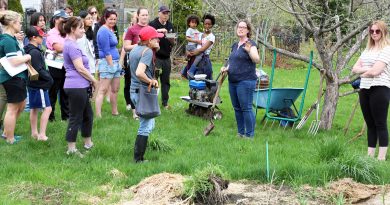Watson on West Carleton
WEST CARLETON – West Carleton Online sat down with City of Ottawa Mayor Jim Watson at his City Hall office on Tuesday, Sept. 4 to talk about a variety of issues related to West Carleton. The conversation focused on topics such as roads, rural living, emergency services, growth and the conversations Mayor Watson is having with the residents of West Carleton.
WEST CARLETON ONLINE: From last year’s Ottawa River Flood, to the start of campaign season for the Oct. 22 Municipal Election, you spend a lot of time in West Carleton. What are you hearing from its residents?
MAYOR JIM WATSON: There was obviously a lot of anti-amalgamation sentiment when it took place (2000) and I don’t see as many Government, Stay Off my Land signs as I used too and I try to get out to West Carleton as often as I can. I am in Carp at least two or three times a month attending events like the Carp Farmers’ Market, I think you can be captive to a nice office right downtown, but I’m not the mayor of downtown, I’m the Mayor of Ottawa. I received a fair amount of positive feedback from the residents, ‘at least we see you, and not just around election time.” I have to get my Bacon on a Bun, my Hudson’s corn.
Grew up in small town of 8,000 people in a small town in Quebec. My mother was born on a farm, my grandfather was a farmer, my uncle is a farmer, I don’t profess to be a farmer, but I come from a family that has farming in their blood, and I think it makes Ottawa a more special place when you can drive 25 minutes and be at the Diefenbunker. I tell people to go visit these parts of the city. You can always go and see Parliament Hill the National Gallery, go see rural Ottawa. That’s why we started the rural expo. Not enough people in downtown or suburban Ottawa are visiting the rural parts (which makes up 82 per cent of the city) of Ottawa. They have no idea about their great shops and their great services and museums. That’s why we started the Rural Expo. I think it’s been really great. It’s been going on for about seven years, in tandem with International Food Day. They set up inside and outside city hall and there are about 100 booths and we put it on free of charge. Come and sell your wares or your services. It allows people to understand.
In Carp, I think Alice’s is great, the community won the Friendliest Community in Canada just a year ago. The challenge is, you want growth, but you don’t want over-growth. You don’t want Carp the Village to turn in to a suburban community. You don’t want it to lose its roots, and that’s the challenge. When people go out there, they really like it and they want to buy a house. And that’s a balancing act allowing some sensible growth but not overpopulation so it’s no longer the great village it is for 150 plus years.
Let me talk about the flood for a minute. What really shone through to me, was the sense of community that came out. You had the Amish come out re-building people’s homes. You had the (West Carleton Royal Canadian) Legion. You had the ham radio operators helping rescue people. People bringing meal after meal to the Legion hall. You had the community centre and the barbecues they held and the volunteer firefighters. It was one of these things, it was a terrible tragedy for loss of property and lack of insurance coverage for many people, luckily no lives were lost. But it really showed how a small-town community really rallies around and helps those in need. We saw it in the east end as well, but there were fewer homes affected compared to West Carleton and Constance Bay. It was quite devastating to go down there. I was down there five or six times with Eli (El-Chantiry), and we had a couple of public meetings. I think it was lots of good lessons learned from things we did well and some other things we need to do better.
Now, when I am out there, and this is consistent in the city, whether it’s rural, urban or suburban. Certainly, in the rural areas, it is the condition of the roads. People are also concerned about speeding on residential streets and in front of school and senior homes. I get that all the time. I go out canvassing now about five out of seven days and that’s the number one issue, the volume and speed of traffic in their communities. That’s why last year we initiated a $40,000 fund for each member of council to fund traffic calming measures and in many instances it has worked. The speed boards collect data that helps the police determine where they send police officers for speed enforcement.
It’s interesting because when I’m in West Carleton, often I am there for a happy event, a 100th birthday party, or the opening of the fair, or the opening of the farmers’ market, I just feel there’s a sense of optimism with the public. We have our lowest unemployment rate in 30 years at 4.2 per cent. We had a big win in south Ottawa with the Hard Rock Café investing in the Rideau Carleton Raceway, the Amazon project in old Cumberland township. The high-tech sector is booming in Kanata which has a positive ripple effect in West Carleton. I try not to look at things with rose coloured glasses thinking everyone is happy with everything all the time. I recognize there is always dissatisfaction with some of the things we do, but at the end of the day, generally there is a sense of pride that we have a government to move some of these projects forward that have been stuck in the mud for 10 years. Lansdowne Park developed, revitalized. Investment in new fire stations and community centres and things like that. You will always find someone who is not happy with what’s gone on, and they might still be fighting amalgamation, but I think most people see the bigger picture, with the city comes some negative, but there are also some positives as well.
WC ONLINE: West Carleton Online did a small online survey on its website and Facebook page and according to respondents, the biggest issue in West Carleton is the roads. What is your response to that?
MAYOR WATSON: We had two really bad winters of freeze-thaw cycles. We had 90 freeze-thaws cycles over the last year. We filled over 265,000 potholes. At the insistence of people like Coun. Eli El-Chantiry and other rural councillors we put $16 million more in to roads last year. We’ve seen a number of roads repaired, last year the bulk of the Carp Road got done, Stagecoach and some others. The challenge in the rural community is the roads are very long. It’s not like Fourth Avenue in the Glebe where the road is a kilometre long. Were talking dozens and dozens of kilomotres. I’m not using this as an excuse, but we did have had two really bad winters, one of the worst in the city’s history, where you have these freeze-thaw cycles that are just brutal on the roads. In our first term we brought in this program called Ottawa On the Move and we fast-tracked about five years’ worth of paving and brought it in to a two-year period, and that worked really well. It got a lot of roads off our list of bad roads, but we still have to do more, and we have to do a better job because the rural communities’ transit system is their car or truck. They don’t have buses out there by and large.
We’ve put a big emphasis on LRT because it’s a big project, and it takes a lot of money out of our reserves, but what I am most proud of, is the rural councillors are supporting the project. They’re not saying, ‘we’re not going to benefit from this so we’re I’m against this.’ Most of the people who live in their wards work in the downtown section of the more urban or suburban parts of Ottawa. They don’t necessarily work in Carp, Fitzroy Harbour or Galetta. Yhey’re working in the high tech sector or other business sectors in the city. We added more money last year, and we’ll have to do more and better next year as well.
WC ONLINE: Emergency service response times are a concern in West Carleton. West Carleton’s neighbours Renfrew County is frustrated with the amount of time their paramedics are spending in the City of Ottawa and are actively lobbying the provincial government to reduce those service calls, what needs to happen to ensure service in West Carleton is maintained or improves?
MAYOR WATSON: We’ve added 24 new paramedics in the last year and a half. My biggest issue, and it makes my blood boil, you go by the Civic or the General, and there are nine ambulances there. Just sitting there because the offload is so slow and you can’t leave the patient until they are properly taken care of, which I understand, and they’ve added a few nurses to help with triage, but there is something wrong with the system, when we have, in many incidents, a third of our fleet, stuck at hospitals for hours and hours upon hours. It’s very unproductive. I didn’t get very far with the previous government, they did provide funding for those off-load nurses as I think they are called, but I think we need to change the rules of the road as you will, once the person enters the hospital, it should be the hospital that’s looking after them. It shouldn’t be the paramedics sitting there in the hallway beside a patient for two or three hours, tying up two paramedics and one ambulance. I think if we get that solved we solve a lot of the angst and frustrations of people in Ottawa, Renfrew and Lanark counties.
The Government of Ontario law is, it is the closes paramedic. Disease and accidents don’t respect boundaries, and with all due respect to the people of Renfrew and Lanark, they send people to our hospitals, that the City of Ottawa financially supports. The City of Ottawa recently put millions of dollars in to the Queensway Carleton. We’re not saying ‘sorry, let me see your passport, where are you from?’ We want to be good neighbours, but it has to be a two-way street. We’ve seen in the last five months or so, a reduction of the number of calls in the city. I don’t know if there have been less accidents or what the situation is, but it seems to be stabilizing, but I think we have to get those parked ambulances out of the hospitals. I live in the west end and when I go home past the hospital I see a supervising vehicle, six or seven paramedics, a couple of police cars, it’s like a first responders’ reunion there. It’s very frustrating for the paramedics. They want to be out there on the road doing their job. Not standing there with a patient they’ve already stabilized. New government, maybe there’s a new way of looking at it. But there has to be something done because it is causing an awful lot of angst and expense in our community.
WEST CARLETON ONLINE: The 2018 Municipal Election is 42 days away and you are seeking re-election. How has the campaign been going?
MAYOR WATSON: I’m glad in many ways the government reduced the time of campaigning. It used to start in January. January to October is a long time to be campaigning. I was listening to CBC last week and the reporter was saying a lot of people think campaigning starts after Labour Day. She added people really start campaigning after Thanksgiving, and it’s true. I’ve been out campaigning and I was on Carp Road a couple of weeks ago, still a lot of people have no idea there’s an election on. They are telling my there just was an election. I’m replying, well that was the provincial election and try to explain that. I love canvassing. It does two things. One I lose weight, which I need to do. Secondly, it grounds you as a politician, when you are on someone else’s turf and they are telling you what their issues are.
The other thing it does is re-enforce my notion that all intelligence doesn’t stem from 110 Laurier Ave., City Hall. What we may think is a big issue, is not resonating with the rest of the city. I think there is a disconnect often between some politicians and some journalists with what goes on here and how everything has to revolve around this little universe, versus what is going on in other people’s neighbourhoods. I gave the example of speeding earlier, but we don’t really talk about that a lot at council and that’s the number one issue I’m hearing while canvassing. I find campaigns are a great way to get in touch with people, listen to their concerns and try to address them. It’s almost like there are two parts to the campaign. One is outlying what you’ve done the last four years, sort of a referendum if people are happy with Landsdowne or the new Ottawa Art Gallery of the fire station or rec centre in Kanata. And then it’s also what you are going to promise for the next term. I’ve always tried to live up to the mantra under-promise and over-deliver, because too many of my colleagues do it the opposite. That adds to the public cynicism. I tell my colleagues don’t go off on a spending spree. It’s fine if you say you want this, that and you’re going to pave every road in West Carleton. You have to figure out where the money is coming from. You have to get the support of at least 12 other people around the council table. You can’t use the excuse, ‘it went down in flames, I couldn’t get the support of the other people.’ Well, that’s kind of your job as a councillor, and in my case, the mayor. You have to get the votes lined up and the budgets passed and get these programs in place.
It’s sometimes hard, and it’s unfortunate politicians will go and say something they know in their heart of hearts, just isn’t doable or not truthful. One of the candidates in this ward (editor’s note: candidate James Parsons’ platform states he will get rid of the Green Bin program) said he’s going to get rid of the green bin. Well that will cost about $12 million to break that contract with an international firm. Well, I didn’t sign that contract, it was before my time, but we have to live with it and were trying to make it better. Dog feces, plastic bags and so on, will be able to go in starting next year. I think it’s disingenuous when politicians go out knocking on doors and promising to be all things to all people. I think it was Paul Martin who said, ‘when you have 100 priorities, you have no priorities.’ And it really is true. Everything can’t be a priority for you, you really have to triage issues and come up with a sensible plan to guide the city. There’s a funny episode of The Simpson’s where Homer Simpson becomes the sanitation commissioner. He ran for this job in Springfield and he talked about how lousy the service was. He promised everything to everyone. And within the first month the entire budget was blown for the year. Not that I’ve seen that with candidates here, I need to be respectful to Homer Simpson, but you have to be very wary of people who are promising things that are going to be hard to deliver without a lot of money or a lot of support. There is a candidate in the Glebe that is promising free transit just on Bank Street. So, the good people of West Carleton will subsidize it for the good people of the Glebe? Well that’s not fair, but he’s going around peddling that as a great idea and some people are buying it. Be wary of those people coming around bearing gifts of free transit or free anything. Because, unless the drivers and buses are donated and we get free gas, it costs something to run a bus down Bank Street and I don’t think the people of West Carleton should be subsidizing a free service that they don’t benefit from. That’s why we have the urban transit levy. I will often come across people who want the transit in the rural areas. Well you can’t have it both ways. You move to the country you are not going to have the same level of services as Route 7 in downtown Ottawa. Most people understand that. But some people want it both ways and it’s just not financially feasible.
WC ONLINE: What is Jim Watson’s priorities going in to the election?
MAYOR WATSON: To continue to make Ottawa an affordable city. We mad a commitment to keep the tax levy at two per cent for my first term; 2.5 per cent this term; and I’ll be setting a target over the course of the election campaign as we release the planks of our platform. I think affordability is important. Lots of people will promise to spend money for every good cause under the sun. We have an obligation to make sure we are not driving people from their homes, because they are paying so much on taxes. A lot of people, especially seniors, are house rich and cash poor. They have a nice house they are living in that they are being forced out of because they can’t afford to pay the taxes.
Having a safe city. I think Eli and Chuck (Police Chief Charles Bordeleau) have done a great job under trying circumstances. We’ve seen a number of shootings, nowhere near the tragedies of Toronto, but that’s why we’ve hired 85 new police officers, to ensure we have a safe city.
LRT is obviously our single largest financial ticket if you will. It’s $2.1 billion this phase and the next phase is even bigger as it goes out further south and east and west at $3.3 billion.
Cleaning up the Ottawa River. That’s vitally important to us, for the beach system as well as our drinking water, we’re about three-quarters of the way of getting our Ottawa River Action Plan implemented, building these giant tanks so when there are heavy rainfalls were not going to be closing all the beaches. I will outline five or six general themes through the course of the campaign and they will come with specific promises and price tags. I think it’s important to not just campaign on rhetoric. You have to have numbers and you have to have facts.












